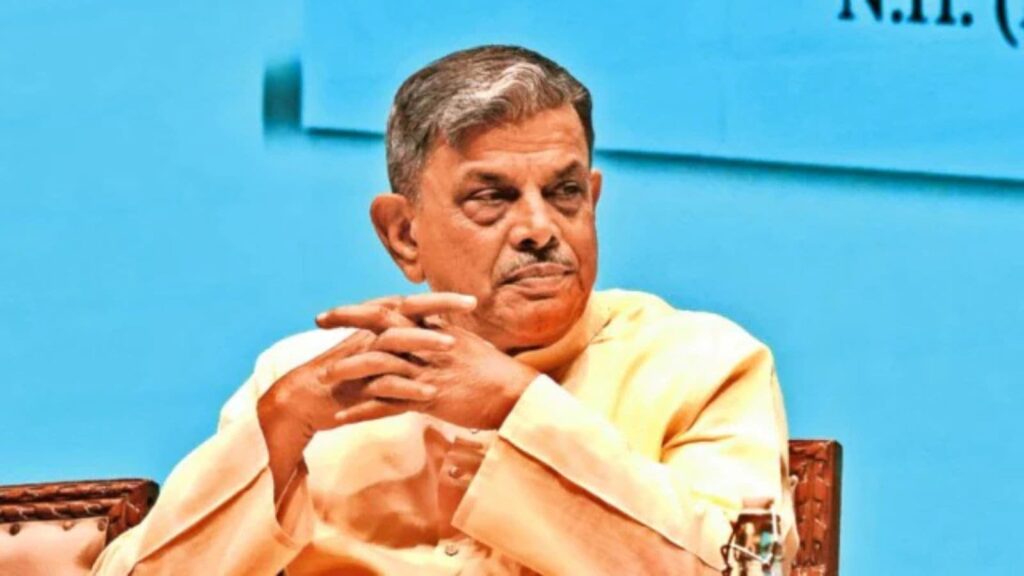RSS general secretary Dattatreya Hosabale Saturday urged the Union government to swiftly formulate a population policy to “correct demographic imbalance”.
“The government has mentioned this on an open platform and also in Parliament. Woh population policy jitni jaldi hogi, utna uska laabh hai (the sooner a population policy is made, the better it will be),” Hosbale told reporters on the last day of the Sangh’s all-India executive body meet in Madhya Pradesh’s Jabalpur.
His remarks come months after Prime Minister Narendra Modi announced a high-powered mission to address demographic change during his Independence Day speech.
Similarly, in her February 2024 interim budget speech before the Lok Sabha polls, Finance Minister Nirmala Sitharaman had announced a high-level committee to deliberate on the challenges of “fast population growth and demographic changes”.
No details are available on the status of the proposed mission or Sitharaman’s announcement. The full budget speeches of July 2024 and February 2025 also made no mention of the latter.
While the RSS has been flagging demographic change for long – particularly because of what it sees as illegal immigration from Bangladesh – RSS Sarsanghchalak Mohan Bhagwat has in recent times taken the line that people should have three children so that population stays at replacement level. Hosabale made no mention of that in Jabalpur. He said: “Infiltration and conversion should be stopped. People say when demographic imbalance is mentioned that it is a communal thought. But think how demographic imbalance will impact national security. Think whether those who say such things are saying it in national interest or only on a communal basis.”
Hosabale listed three reasons for “demographic imbalance” — infiltration, conversion, and higher rate of growth in some communities. “For stopping conversion, there are laws, but the attempts have to be on a social basis,” he said.
On August 15, Modi had in his speech: “As part of a conspiracy, the demography of the country is being altered… These infiltrators are snatching the livelihoods of our youth, targeting our sisters and daughters, and misleading innocent tribals and seizing their lands… Through this mission, the severe crisis will be addressed in a deliberate and time-bound manner.”
As many as 397 delegates attended the three-day meet of the second highest decision making body of the RSS, which was 10 below the invited strength.
Informing reporters that Manipur was discussed at the meet, Hosabale Saturday said the situation had become very bad but was improving. “The Centre also took steps. The Prime Minister went there despite bad weather. Swayamsevaks were there on the ground for two years,” he said. “The people there want a popular government; we also do. But we believe the government will do it at the appropriate time.”
Hosabale welcomed instances of Maoists in Chhattisgarh and Jharkhand surrendering to join the mainstream. He said delegates also discussed a “growing problem” of drug addiction.
In response to a question, Hosabale took a dig at the TMC government in West Bengal without naming the party or CM Mamata Banerjee, “The Bengal situation is troublesome. We did not discuss it here though. Our work is increasing in Bengal. But because of the political leadership there, hatred has spread after the last elections. Making a border state violent and unstable will not be good for the country.”
Asked about Congress president Mallikarjun Kharge’s opinion that the Sangh be banned, Hosabale said he should learn from the past and see in which way society is going.
While supporting the caste census for data generation yet again, with a plea not to use it for political mileage, Hosabale said the RSS has been trying for 100 years to transcend caste.
Hosabale said the meet also discussed the centenary year activities of the Sangh, like door-to-door meets, Hindu Sammelans, Samajik Sadbhav meets and meetings with local notables all across the country.
The RSS also released statements on the 150th year of the birth of Birsa Munda, the 350th year of the ‘martyrdom’ of Guru Tegh Bahadur, and 150 years of the composition of national song Vande Mataram.

